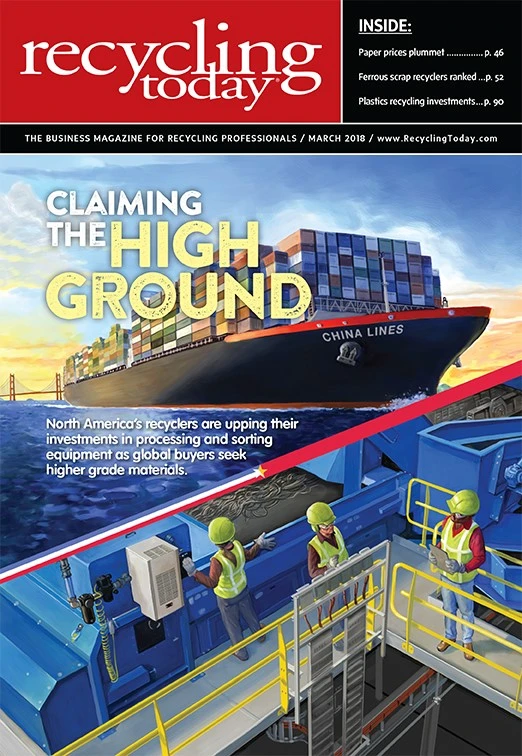

Copper and aluminum can be considered high-value forms of scrap metal, but their value never reaches the level of precious metals such as gold, silver, platinum
Among the
Converters are among the largest markets for PGMs and are a leading scrap source when the valuable metals re-enter the resource loop. The North American market for converter scrap is steady and competitive, providing an incentive for auto dismantlers and scrap processors to always know their options.
Becky Berube, president of Greenville, South Carolina-based United Catalyst Corp., says recyclers should be aware of those options and can benefit from learning a few simple techniques in the converter recycling sector.
In an interview with Recycling Today, Berube offers advice on how scrap processors and auto dismantlers can maximize their returns when handling converters. She also reflects on her path as a woman in the scrap industry and the role of persistence in her career.
Recycling Today (RT): How did you get involved in the recycling industry and in the catalytic converter sector in particular?
Becky Berube (BB): Interestingly, I became involved with catalytic converter recycling through my husband, Tim, while working as a portfolio accountant for Putnam Investments in Boston. My in-laws were involved in automotive repair, and, as newlyweds, Tim was working in converter recycling while pursuing a degree in architecture. As Tim launched a small recycling company, I researched the recycling and refining supply chain and eventually joined him in the company.
RT: What guidelines do you offer your customers in terms of how they handle sorting or selling their scrap converters?
BB: In converter recycling, the best recyclers know their numbers and partner with companies that educate. First, we encourage our customers to sell converters on
RT: Overall, how can converter recycling specialists help more generalized recycling companies maximize their converter-related revenue?
BB: We have found that converting recycling companies to assay-based selling, reducing their recycling costs, returning more metal to them and helping them sell the metals at the highest price into the market are the keys to maximizing their converter-related revenue. Recycling companies need to work with companies that are subject matter experts, who view themselves as partners willing to give recyclers more value and teach them how to audit their sales.
RT: To what extent does platinum metals group pricing affect the way your firm interacts with its customers? Do you consider scrap converter flows as elastic?
BB: We are fortunate to work with very successful and educated recycling companies. Educated recyclers are our best customers because, with them, you can develop a short- or long-term selling strategy that meets their cash flow needs. Like an experienced investment advisor, we can help our customers continuously sell metal into the market like dollar-cost averaging or hold metal on account for a future sale. Many of our customers prefer a risk-neutral strategy and supply converters in all market conditions. They trust that, regardless of the trend, we are working to sell on highs.
RT: What types of companies comprise the scrap converter consuming end market, and do they tend to be in North America or overseas?
BB: The majority of the worldwide supply of scrap catalytic converters and spent automotive catalyst finds its way to North America for recycling. The processors, smelters, refiners and trading companies that consume the precious metals produced from converter recycling are global companies with North American operations.
RT: In what ways, if any, has being a woman in a recycling industry executive role proven to be challenging for you? Are you hopeful you can provide inspiration for younger women entering the recycling industry management ranks?
BB: It’s fun to reflect on now, but being a 20-something in the early 1990s scrap recycling industry was very challenging. Can you picture me at an ISRI (Institute of Scrap Recycling Industries) Consumers Night? I was young, green and a woman calling on a well-established industry for new business—a rookie. But isn’t that where we all start?
I do want to provide inspiration for younger women entering the recycling industry management ranks. I’ve had the privilege of serving as the North American commercial manager for a global refiner and the president of a converter recycling and precious metals management company.
My advice is this: It’s always too soon to quit. Become a subject matter expert and go to bat for your customers, returning them more value and making them more money. Customers are loyal to people and companies that have their best interest at heart.
RT: How has volunteering for leadership roles with the Automotive Recyclers Association (ARA), the International Precious Metals Institute and other trade groups affected your career path?
BB: I believe it has been beneficial because there is no substitution for involvement in your industry.
Sponsored Content
Labor that Works
With 25 years of experience, Leadpoint delivers cost-effective workforce solutions tailored to your needs. We handle the recruiting, hiring, training, and onboarding to deliver stable, productive, and safety-focused teams. Our commitment to safety and quality ensures peace of mind with a reliable workforce that helps you achieve your goals.
Volunteering is about more than paying it forward or giving back. Until you become fully immersed in your field and understand the issues that affect your customers, you cannot fully serve or return value to them. You must help others achieve their goals while achieving yours.
Get curated news on YOUR industry.
Enter your email to receive our newsletters.

Explore the March 2018 Issue
Check out more from this issue and find your next story to read.
Latest from Recycling Today
- Athens Services terminates contract with San Marino, California
- Partners develop specialty response vehicles for LIB fires
- Sonoco cites OCC shortage for price hike in Europe
- British Steel mill’s future up in the air
- Tomra applies GAINnext AI technology to upgrade wrought aluminum scrap
- Redwood Materials partners with Isuzu Commercial Truck
- The push for more supply
- ReMA PSI Chapter adds 7 members







